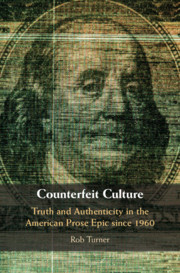Book contents
- Counterfeit Culture
- Cambridge Studies in American Literature and Culture
- Counterfeit Culture
- Copyright page
- Dedication
- Epigraph
- Contents
- Figures
- Acknowledgements
- Introduction: America and the ‘Way to the Devil’
- Chapter 1 Marguerite Young’s Flood of Consciousness
- Chapter 2 William Gaddis and the ‘Novel-Writing-Machine’ of Andy Warhol
- Chapter 3 ‘Paper Reality’: William S. Burroughs and the Cut-Up Method
- Chapter 4 ‘Bad History’: Thomas Pynchon and the Apocryphal Epic
- Chapter 5 ‘History Shambles On’: William T. Vollmann and the Seven Dreams Cycle
- Conclusion: ‘Every Story Has Two Tails’
- Bibliography
- Index
- Recent books in this series (continued from page ii)
Chapter 4 - ‘Bad History’: Thomas Pynchon and the Apocryphal Epic
Published online by Cambridge University Press: 22 June 2019
- Counterfeit Culture
- Cambridge Studies in American Literature and Culture
- Counterfeit Culture
- Copyright page
- Dedication
- Epigraph
- Contents
- Figures
- Acknowledgements
- Introduction: America and the ‘Way to the Devil’
- Chapter 1 Marguerite Young’s Flood of Consciousness
- Chapter 2 William Gaddis and the ‘Novel-Writing-Machine’ of Andy Warhol
- Chapter 3 ‘Paper Reality’: William S. Burroughs and the Cut-Up Method
- Chapter 4 ‘Bad History’: Thomas Pynchon and the Apocryphal Epic
- Chapter 5 ‘History Shambles On’: William T. Vollmann and the Seven Dreams Cycle
- Conclusion: ‘Every Story Has Two Tails’
- Bibliography
- Index
- Recent books in this series (continued from page ii)
Summary
‘The time has come’, wrote Burroughs in Port of Saints (1973), ‘to travel in time … We will rewrite all the wrongs of history. We will kill all the shits before they can be born’. With this, the writer unveiled the subject of his forthcoming second epic, a work that would attempt to inhabit the apophatic vacuum left behind by The Ticket That Exploded. Avoiding the experimental extremes of his Olympia books, the ‘Red Night’ trilogy (published between 1981 and 1987) would turn out to be significantly more reserved than its predecessor; framing the transition between the two in astronomical terms, Alex Houen has referred to the Nova Trilogy as ‘a literary Big Bang’, and suggested that it is only ‘with the Cities of the Red Night trilogy [that Burroughs began] to form more distinct worlds’. The implicitly entropic process can indeed be glimpsed throughout the later texts, which bear an unmistakable sense of winding down, leading to the valedictory announcement on the penultimate page of its final volume:
All the filth and horror, fear, hate, disease and death of human history flows between you and the Western Lands. Let it flow! My cat Fletch stretches behind me on the bed. A tree like black lace against a gray sky. A flash of joy.
- Type
- Chapter
- Information
- Counterfeit CultureTruth and Authenticity in the American Prose Epic since 1960, pp. 110 - 144Publisher: Cambridge University PressPrint publication year: 2019



